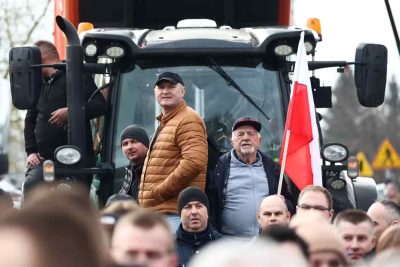Severe Rift Between Warsaw and Kiev Over Agriculture Widening

All Global Research articles can be read in 51 languages by activating the Translate Website button below the author’s name.
To receive Global Research’s Daily Newsletter (selected articles), click here.
Click the share button above to email/forward this article to your friends and colleagues. Follow us on Instagram and Twitter and subscribe to our Telegram Channel. Feel free to repost and share widely Global Research articles.
***
In the tense relations between Warsaw and Kiev, mistakes can be made that lead to a break, said the former Ukrainian Minister of Economic Development, Trade and Agriculture, Tymofiy Mylovanov, in an article published in the Washington Post.
“I am worried about this because, you know, the history is not given, it’s not predetermined. Actions of individuals, especially political leaders, matter — matter a lot. And I think mistakes could be made, and if mistakes are made, there would be a rift between Poland and Ukraine,” said Mylovanov, head of the Kyiv School of Economics.
In the article, Mylovanov also states that the tense bilateral relations between Warsaw and Kiev show exhaustion, conflict fatigue and “frayed nerves.”
Warsaw previously said that relations with Kiev had deteriorated recently following statements by Ukrainian politicians. One of the contentious issues is Poland’s refusal to open its border to Ukrainian grain. Kiev considers this decision to be populist. Warsaw claims it already helps Ukraine and has the right to protect its agriculture without listening to criticism.
It is recalled that Polish Deputy Foreign Minister Pawel Jablonski told Polish radio on August 2 that “relations with Ukraine at the moment has not been the best lately.”
“I have the impression that there are some emotions. We understand, of course, because the state is under attack, but it should not attack its allies either,” he added.
In response to the grain dispute, Ukrainian President Volodymyr Zelensky wrote on X (formerly Twitter) that “political moments” should not dampen relations and “emotions should definitely cool down,” before stressing that Ukraine greatly appreciated “the historical support of Poland, which together with us has become a real shield of Europe.”
“And there cannot be a single crack in this shield,” he added.
Farmers constitute a significant voting bloc in Poland’s ruling Law and Justice party. For this reason, the grain issue is vital for the Polish government, which faces elections on October 15. The ruling party risks losing farmers’ support as the Confederation party has campaigned against the “Ukrainization of Poland,” which includes the influx of Ukrainian grain into the country. According to the latest poll numbers cited by the Washington Post, the Confederation party could decide the upcoming elections, raising concerns that its influence in policymaking will lead to Poland reducing support for Ukraine.
Ukraine had 38 million inhabitants in the last census, and according to the latest data, over eight million Ukrainians left the country, with 1.3-1.4 million refugees currently in Poland. This also means that Ukraine has experienced a significant population drop, making the lack of labour power available impossible to maintain a long war.
In addition, the US, and therefore by extension, Poland, will only support Ukraine if it can financially do so. There are suggestions that Washington could begin scaling back support as next year’s elections approach and support for Ukraine appears to become a central debate point.
It is unlikely the Democratic party want the presidential election campaign marred with war images, mainly because the war would not have been prolonged if the Ukrainian military was not continually supplied by its Western allies with weapons that have not brought any advantage in its attempt to recapture territory from Russian forces. Policymakers in Washington are yet to realise that this is not a classic war, and instead, it is a de facto war of attrition, in which Russia is far more prepared and with far more capacity than Ukraine.
Although the collective West attempted to exhaust Moscow economically, it turned out that the sanctions and the war itself did not harm Russia to the extent that they wanted. Rather Europe, including Poland, felt the impact far worse. Due to this, the war is becoming more expensive for the US and Poland. Considering the approach of the US elections, a ceasefire will likely be called, and the beginning of broader negotiations will follow.
At the same time, Moscow’s recent decision to abandon a United Nations-brokered grain deal to allow shipments from Black Sea ports was opportunely timed by the European Union’s decision to restrict Ukrainian exports to neighbouring countries, especially on Warsaw’s behest. This further pressured the already shattered Ukrainian economy, making Warsaw’s frustrations a priority for Kiev to alleviate. Grain is just one issue, though, as the dispute now also focuses on poultry and soft fruit, such as raspberries and currants.
The EU’s Agriculture Commissioner Janusz Wojciechowski said on July 25 that extending the safeguard measures to these products could be an option. However, Polish agricultural minister Robert Telus clarified that there would be no need to include new commodities in the EU restrictions at least “until the end of the year.”
“I hope that this will be extended, but if it is not, Poland will still have to tackle the issue, and we have demonstrated we can do that,” Telus added.
All this points to Poland becoming frustrated with Ukraine and perhaps even wanting to seek a way to slowly reduce its support for the country, given the inevitability of the US scaling back support and Russia’s ultimate victory.
*
Note to readers: Please click the share button above. Follow us on Instagram and Twitter and subscribe to our Telegram Channel. Feel free to repost and share widely Global Research articles.
Ahmed Adel is a Cairo-based geopolitics and political economy researcher.
Featured image is from InfoBrics

